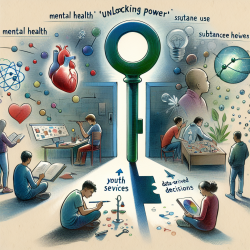In the quest to provide effective and scalable interventions for children with Autism Spectrum Disorder (ASD), the recent COMPASS trial has shed light on the clinical and cost-effectiveness of the PASS Plus intervention. This trial, conducted in New Delhi, India, provides a robust framework for practitioners aiming to improve their skills and outcomes in treating young children with ASD. Here, we delve into the key findings and practical applications of this research.
Key Findings of the COMPASS Trial
The COMPASS trial was a large-scale, two-arm, single-blinded, randomized controlled trial that evaluated the PASS Plus intervention in addition to treatment as usual (TAU) compared to TAU alone. The primary outcome was autism symptom severity, assessed using the Brief Observation of Social Communication Change (BOSCC). Secondary outcomes included parent-child communication, child adaptation, quality of life, and parental wellbeing.
- Autism Symptom Severity: The trial demonstrated a significant reduction in autism symptom severity in the intervention group compared to the TAU group.
- Parent-Child Communication: Enhanced parent-child communication was observed, mediated by the Dyadic Communication Measure for Autism (DCMA).
- Cost-Effectiveness: The intervention was found to be cost-effective, with significant improvements in quality-adjusted life years (QALYs) for the child.
Implementing the Findings in Practice
Practitioners can leverage the insights from the COMPASS trial to enhance their therapeutic approaches for children with ASD. Here are some actionable steps:
- Adopt Parent-Mediated Interventions: The PASS Plus intervention emphasizes the role of parents in facilitating social communication. Practitioners should consider incorporating parent-mediated techniques into their therapy sessions.
- Utilize Video Feedback: The use of video feedback to train parents in recognizing and responding to their child's communication cues was a critical component of the intervention. This technique can be adapted to various settings, including online therapy.
- Address Coexisting Conditions: The PASS Plus modules also tackled common coexisting issues such as sensory difficulties and disruptive behaviors. A comprehensive approach that addresses these conditions can lead to better overall outcomes.
Encouraging Further Research
While the COMPASS trial provides valuable insights, it also highlights the need for ongoing research. Practitioners are encouraged to explore the following areas:
- Long-Term Impact: Further studies should investigate the long-term impact of parent-mediated interventions on children with ASD.
- Cultural Adaptations: Research on how these interventions can be culturally adapted for different regions and communities will be crucial for global applicability.
- Technology Integration: Exploring the use of digital platforms and remote supervision can enhance the scalability and accessibility of these interventions.
To read the original research paper, please follow this link: A randomised controlled trial of clinical and cost-effectiveness of the PASS Plus intervention for young children with autism spectrum disorder in New Delhi, India: study protocol for the COMPASS trial.










